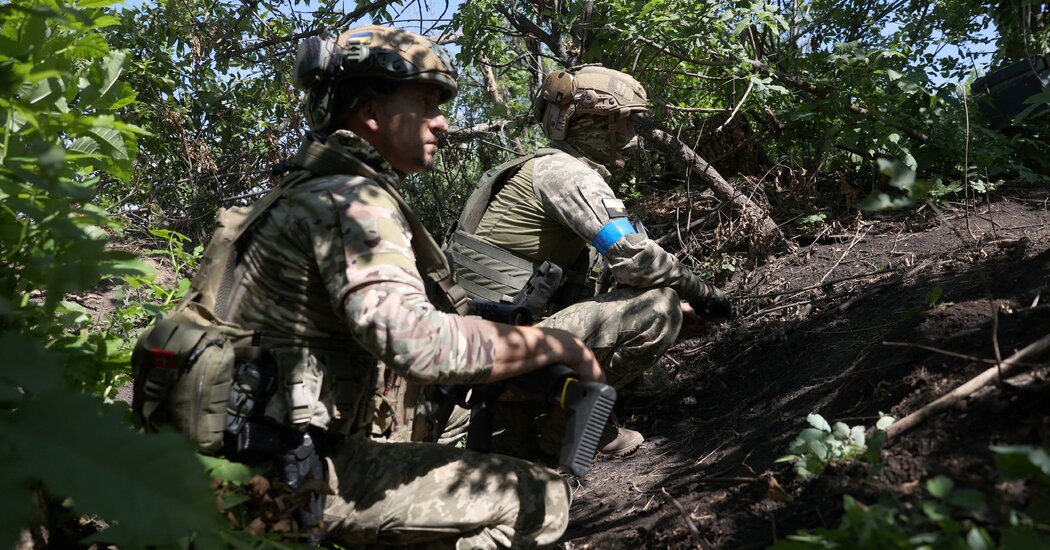Ukraine’s military said Sunday it had retaken the small village of Klishchiivka, the second settlement to come back under Kyiv’s control in three days and the most significant recent advance in its hard-fought counteroffensive to drive Russian forces from the country’s east.
Klishchiivka had been occupied by Russian forces since January, when Wagner mercenaries captured it after weeks of combat as part of the nearly yearlong battle for the nearby city of Bakhmut.
After Bakhmut fell to Russian troops in May, Ukrainian forces almost immediately began a push to drive Moscow’s troops from areas to the north and south of the city. With Klishchiivka sitting on high ground overlooking roadways in and out of a ruined Bakhmut, the village was very much in their sights.
In recent weeks, Kyiv’s troops had been slowly advancing on Klishchiivka, taking heavy casualties in pitched battles.
On Friday, the Ukrainian military said its forces had gained control of Andriivka, a small farming hamlet a little more than two miles to the south.. Then on Sunday evening, the 80th Separate Airborne Assault Brigade posted a video of soldiers holding the yellow-and-blue flag of Ukraine in front of a ruined building and a destroyed church as loud booms echoed in the background.
“The settlement of Klishchiivka was finally freed,” read the video’s caption on Facebook, crediting its own fighters and those from two other brigades.
Gen. Oleksandr Syrsky, the commander of Ukraine’s ground forces, soon announced the news, writing on Telegram that Klishchiivka had been “cleared of the Russians,” and in his nightly address, President Volodymyr Zelensky commended the soldiers.
“Klishchiivka! Well done!” he said.
There was no immediate comment from the Russian Defense Ministry, which only mentioned fighting near Klishchiivka in a Sunday evening update, and the claims could not immediately be independently confirmed.
The retaking of Klishchiivka may help Ukraine apply pressure to the Russian forces holding Bakhmut, which Moscow has devoted resources to defending even though it has been reduced to rubble. Klishchiivka, about six miles south of the city, holds a commanding position that could allow Ukrainian artillery to more accurately shell Russian forces entering or exiting Bakhmut.
Russian forces’ conquest of Bakhmut, which once had a population of 70,000, was their first major battlefield victory in months. But the city lies in a bowl that has left the Russian defenders there in an increasingly perilous position as Ukrainian troops slowly claw back territory on its periphery.
The claim of a further advance in the east came as there were signs that Ukraine may be able open an alternative route for grain shipments in the face of Russia’s de facto blockade of its ports. On Sunday, the first cargo vessels to arrive at a Ukrainian port since July, when Russia terminated a deal that had allowed Kyiv to export food crops across the Black Sea, were moored in Chornomorsk.
Ukrainian grain exports are both a vital source of foreign exchange for the country and a crucial factor in global food markets, particularly for countries in Africa and the Middle East that are facing hunger. But establishing a corridor secure enough for a regular flow of cargo vessels from Ukraine’s seaports is risky, not least because the Black Sea has become an increasingly critical theater in the war.
The two vessels that moored in Chornomorsk — the bulk carrier Aroyat and the cargo vessel Resilient Africa — are expected to be loaded with about 22,000 tons of wheat that is destined for countries in Africa and Asia, Ukraine’s infrastructure minister, Oleksandr Kubrakov, said Saturday.
“First civilian vessels use the temporary corridor to reach Ukrainian ports,” Mr. Kubrakov wrote. “The vessels fly the flags of Palau, and their crew consists of citizens of Turkey, Azerbaijan, Egypt and Ukraine.”
It was not clear when the ships would leave Chornomorsk.
Both ships hugged the coast once they entered Ukrainian waters on Saturday, according to data from the Marine Traffic website. Resilient Africa had set off from the Romanian port of Constanta, while Aroyat had departed from a port in Turkey.
Underlining the risks, Russia launched a drone and missile attack early Sunday on the Odesa region of southern Ukraine. A granary and farmland north of the port city of Odesa were hit, according to Oleh Kiper, the head of the regional military administration
Russia has repeatedly launched missiles and drones at grain facilities and the port of Odesa since it left the Black Sea Grain Initiative, a deal brokered by Turkey and the United Nations that for a year had established a corridor through which Ukraine could ship wheat, barley and other crops. That deal gave Ukrainian ships passage directly across the Black Sea from Odesa and two nearby ports to the Bosporus off Turkey.
Russia has also struck Ukraine’s Danube River ports at Izmail and Reni, which are increasingly used as an alternative to the main ports along the Black Sea.
In addition to abrogating the grain deal, Russia said in July that it would consider any ship sailing into a Ukrainian port as potentially carrying military cargo, in a clear warning to civilian shipping. Last month, a Russian patrol vessel fired warning shots at a civilian vessel on the Black Sea and then boarded it to conduct an inspection.
Thomas Gibbons-Neff contributed reporting.

